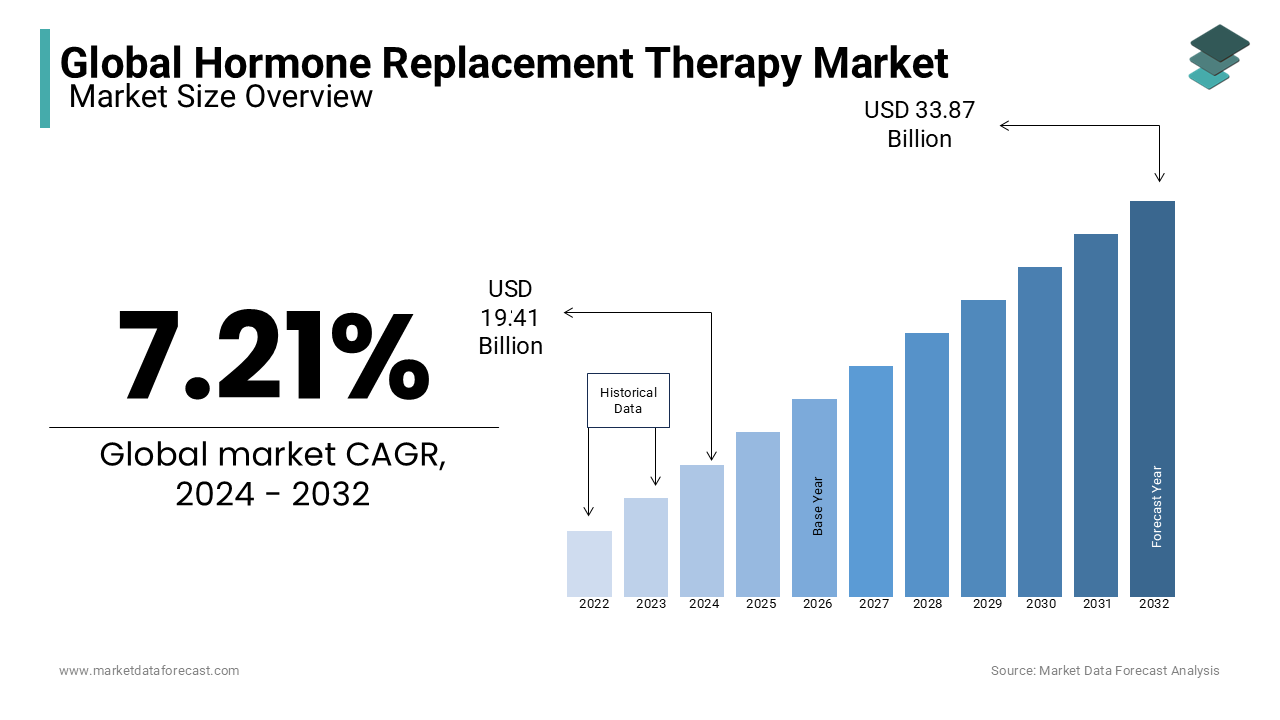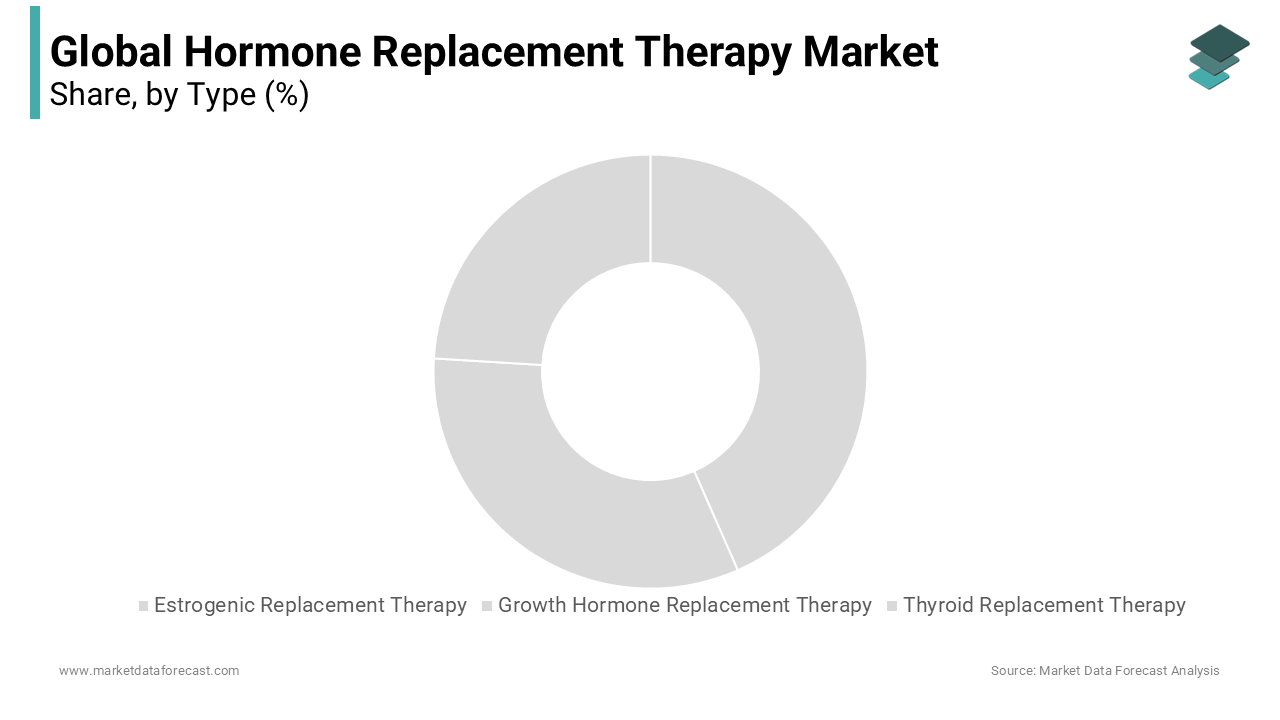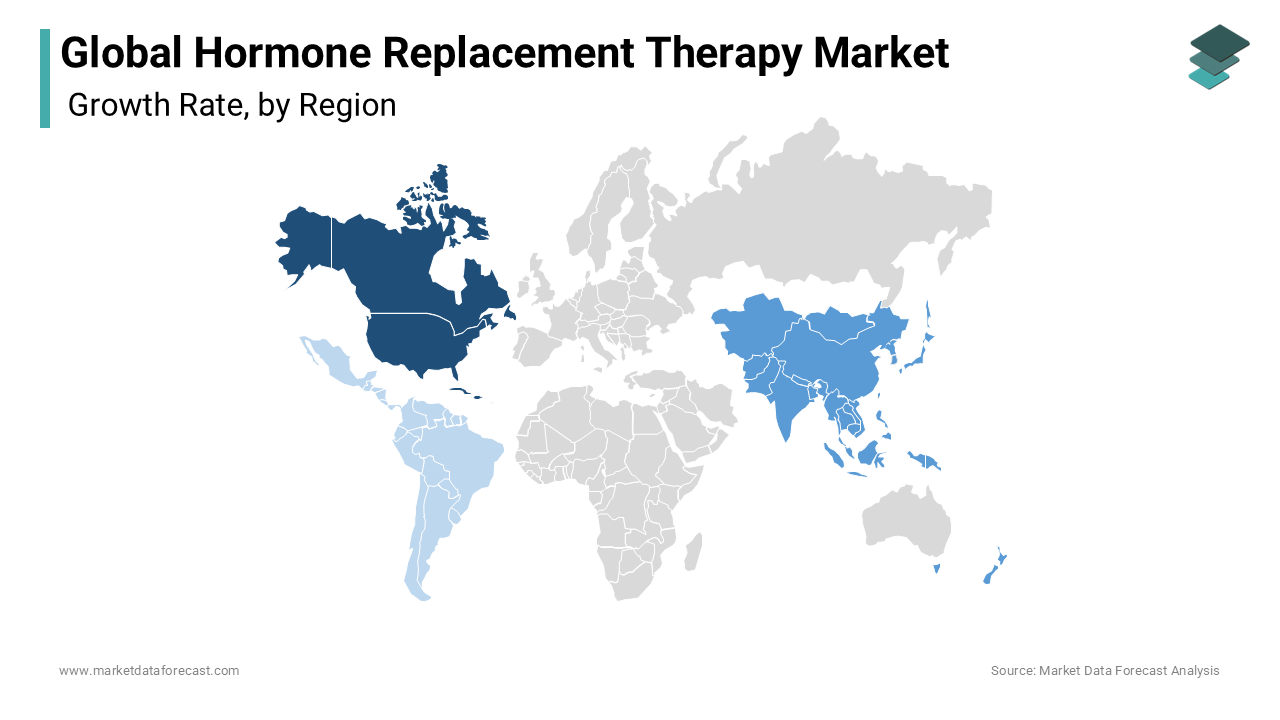Global Hormone Replacement Therapy Market Size, Share, Trends & Growth Forecast Report - Segmented By Type (Estrogenic Replacement Therapy, Growth Hormone Replacement Therapy and Thyroid Replacement Therapy), Route of Administration (Oral, Parenteral, Transdermal and Other Routes) and Region (North America, Europe, Asia Pacific, Latin America, and Middle East & Africa) - Industry Analysis (2024 to 2032)
Global Hormone Replacement Therapy Market Size (2024 to 2032)
The global hormone replacement therapy market was worth USD 18.10 billion in 2023 and the global market is expected to grow at a CAGR of 7.21% from 2024 to 2032 and be worth USD 33.87 billion by 2032 from USD 19.41 billion in 2024.

Current Scenario of the Global Hormone Replacement Therapy Market
The awareness and adoption of hormone replacement therapy (HRT) has grown substantially worldwide in recent years and the market for home replacement therapy has registered prominent growth in the last few years. HRT is used to address various hormonal imbalances and manage symptoms associated with menopause, such as hot flashes, night sweats, vaginal dryness and mood swings. Among medical professionals, HRT has gained recognition as a promising therapy to reduce the risk of osteoporosis and cardiovascular diseases in postmenopausal women by fulfilling the declining hormone levels. The awareness among people regarding menopausal symptoms and their impact on quality of life has been growing continuously and resulting in the increasing demand for HRT services.
Historically, countries such as the United States, Japan and some of the European nations have been the largest users of hormone replacement therapies and the demand for HRT services is expected to remain high in these countries during the forecast period. However, the demand for HRT services is growing gradually in developing countries such as China and India as these countries have been experiencing rapid urbanization, frequent shifts in lifestyle changes, and growing access to advanced healthcare techniques. Considering these situations, the demand for HRT services is expected to continue to be solid in the coming years and boost the global HRT market growth.
MARKET DRIVERS
The rising geriatric population and behavioral changes are majorly driving the growth of the global hormone replacement therapy market.
As people age, their health concerns increase, resulting in chronic illness. Hormonal balance is necessary for reducing the Impact of many diseases. In the case of lactating women, hormones like progesterone and estrogen play a vital role due to the behavioral changes in women's lifestyles; there is a massive demand for hormone therapy in pre and post-pregnancy and lactating periods, respectively. Apart from these aspects, increased expenditure on R&D and people's consciousness of health are also the aspects that are driving the global hormone replacement therapy market for further expansion. There are many opportunities for the HRT process due to the people's behavioral aspects, there is a lot of scope for hormone replacement therapy market expansion.
Many non-curable diseases are nowadays addressed with Hormone therapy techniques. Particularly in the case of women experiencing menopause in the very early stage, like in the mid-40s, they are interested in exploring the H.R. therapies for estrogen and progesterone therapies. In addition, impotent males and people with medical illnesses are tilting towards safe hormone replacement therapies. Increased investments in developing countries for such advanced therapies provide a significant opportunity for the market players to expand and capture the segment in those countries.
MARKET RESTRAINTS
The high cost of these therapies, some side effects, and product shortages due to weak pipelines are some factors that hinder the growth of the global hormone replacement therapy market.
Generally, harmonic imbalances are pretty natural in people who do not maintain a proper lifestyle, so correcting those imbalances is a tedious task and requires a lot of effort, both behaviorally and financially. So, it is a barrier for the market. Regulatory approvals for these therapies are complex and cannot be obtained easily. As these therapies are highly advanced, less developed countries lack awareness and cannot afford to invest in these kinds of research. Less penetration and a lack of prominent players in significant markets like APAC are barriers to expanding the global hormone replacement therapy market. In Hormone replacement therapy, the process is involved where there is a disease that is involved with hormonal imbalance. The therapy targets particular cells, as the adjoining cells should not be disturbed. So this makes Hormone replacement therapy costlier. Also, HRTs make patients more exposed to cancer and cell disorders risks. Apart from all the above-stated factors getting regulatory approvals for the HRTs, either for clinical research or application, is quite challenging.
REPORT COVERAGE
|
REPORT METRIC |
DETAILS |
|
Market Size Available |
2023 to 2032 |
|
Base Year |
2023 |
|
Forecast Period |
2024 to 2032 |
|
Segments Covered |
By Type, Basis of Route of Administration, and Region |
|
Various Analyses Covered |
Global, Regional & Country Level Analysis, Segment-Level Analysis, Drivers, Restraints, Opportunities, Challenges; PESTLE Analysis; Porter's Five Forces Analysis, Competitive Landscape, Analyst Overview on Investment Opportunities |
|
Regions Covered |
North America, Europe, Asia Pacific, Latin America, Middle East & Africa |
|
Market Leader Profiled |
Abbott Laboratories, Novartis, Pfizer, Mylan Laboratories, Amgen, Merck & Co, Bayer |
SEGMENTAL ANALYSIS
Global Hormone Replacement Therapy Market Analysis By Type

The estrogenic replacement therapy segment dominates the market with a market share of more than 60%. This replacement therapy in which estrogenic hormones are commonly used to treat the symptoms seen in women for menopause. This helps to decrease short-term changes of menopause, like vaginal dryness, hot flashes, and disturbed sleep in women.
Thyroid replacement therapy is the next segment that drives the market forward. This therapy is used to level the thyroid hormones in the body. This is mainly used for the treatment of hypothyroidism. A large portion of this therapy is taken in India and America. Forty percent of women in the U.S. suffer from thyroid problems, which drives the market forward.
Global Hormone Replacement Therapy Market Analysis By Route of Administration
The oral route segment is predicted to account for the largest share of the global market during the forecast period. oral route is regarded as one of the safest and most preferred routes of drug administration. Therefore, the Oral Route of Administration segment is accounted for the highest market share. This oral segment is a sub-division of enteral administration.
Transdermal is the next segment that drives the market forward. In this, the drug or medicine is given through the skin for more absorption of the drug into the bloodstream, giving a faster response than oral. However, most doctors did not prefer this treatment for every thyroid patient.
REGIONAL ANALYSIS

The North American Region is likely to dominate the global market during the forecast period due to factors such as new methods or products in drug delivery systems, the development of new drugs, and an increase in the target population. Also, the growing incidence of menopause disorders, the rising prevalence of hormone deficiency disorders, and the awareness among the people related to these therapies further drive the North American regional market. More than 50 million American women use estrogen replacement therapy (ERT) for chronic disease prevention. Canada has approved hormone replacement products to treat menopausal symptoms such as night sweats and vaginal dryness. This Region also provides pills, patches, and gel for these diseases. In addition, the U.S. National Institutes of Health (NIH) launched the Women's Health Initiative to study and research post-menopausal women in 40 U.S. centers.
The Asia-Pacific market is likely to register the highest growth rate over the forecast period due to factors such as awareness among people regarding hormone replacement therapy in APAC countries such as China, India, and Japan. Pediatric growth hormone deficiency is a rare disease caused due to insufficient secretion of growth hormone from the pituitary gland. A decrease in hormone growth can lead to different types of psychological disorders. In China, nearly 3.4 million children with growth hormone deficiency drive the market growth. In 2021, Hypoparathyroidism was the first hormone replacement therapy in China. Hormonal replacement therapy has been increasing in Japan in recent years. The Japan Society of Obstetrics and Gynecology and the Japan Society for Menopause and Women's Health formed the hormone replacement therapy rules. Most Indian women are facing menopause problems. It is a natural phenomenon where the menstrual cycle ceases at around 45-50 years in India, requiring hormone replacement therapy.
The Middle East and Africa are likely to have moderate demand due to increasing occurrences of chronic diseases like cancer that require hormone replacement therapy due to the increase in healthcare advancements and government initiatives supporting the growth of the hormone replacement therapy market in the Middle East and Africa region. Countries such as Saudi Arabia, Qatar, and others also drive the market forward. Most women in Saudi Arabia are suffering from menopausal symptoms and breast cancer and would like to prefer hormone replacement therapy as an ideal method to treat menopausal symptoms. Hormone therapy is also used for treating breast cancers.
Latin America also has the market share due to increasing women's healthcare, increasing spending on hormone replacement therapy, and the demand for estrogen replacement drives the market forward in this Region. Mexico and Brazil share the most significant portion of this Region. In Brazil, transgender people are highly prone to gender dysphoria, requiring testosterone hormone therapy.
KEY PLAYERS IN THE HORMONE REPLACEMENT THERAPY MARKET
Some of the prominent companies operating in the global hormone replacement therapy market profiled in the report are Abbott Laboratories, Novartis, Pfizer, Mylan Laboratories, Amgen, Merck & Co, Bayer, Eli Lily, Novo Nordisk, Wyeth, F. Hoffmann-La Roche, Hisamitsu Pharmaceutical Co. Inc. Leading companies are focusing on collaborations and mergers, which are anticipated over the next seven years to share the cost of technology and innovation in this area.
RECENT HAPPENINGS IN THE MARKET
- In 2022, Hormone Replacement Therapy was launched by Lindora. They offer this therapy because the lack of hormone levels in the body leads to several changes, such as fatigue, anxiety, decreased libido, weight gain, and sleeplessness problems. In addition, ORLANDO, an oral testosterone replacement therapy for adult males, was launched by Halozyme in 2022. This therapy is used by people suffering from diseases due to a shortage or absence of endogenous testosterone.
- In 2022, Pfizer Inc. and OPKO Health Inc. joined and announced the approval for the next-generation long-acting recombinant human growth hormone NGENLA. This is given to people suffering from insufficient growth hormone secretion.
- In December 2019, Pfizer, Inc. introduced a new drug known as Xtandi, which has received acceptance from U.S. FDA. This Xtandi is a combination of anti-hormone therapy and helps reduce cancer spreading. Pfizer completed the Weiss merger in December 2014, outpacing popular products such as Prempro and Premarin.
- In 2021, I-Mab, a biopharmaceutical company, partnered with Jumpcan Pharmaceutical Group to develop novel biologics, Eftansomatropin alfa. It is an innovative long-acting recombinant human growth hormone (rhGH) utilized for Genexine's patented half-life extension sync fusion technology.
DETAILED SEGMENTATION OF THE GLOBAL HORMONE REPLACEMENT THERAPY MARKET INCLUDED IN THIS REPORT
This research report on the global hormone replacement therapy market has been segmented and sub-segmented based on type, route of administration and region.
By Type
- Estrogenic Replacement Therapy
- Growth Hormone Replacement Therapy
- Thyroid Replacement Therapy
By Route of Administration
- Oral
- Parenteral
- Transdermal
- Other Routes
By Region
- North America
- Europe
- Asia-Pacific
- Latin America
- Middle East & Africa
Frequently Asked Questions
How big is the global hormone replacement therapy market?
As per our research report, the global hormone replacement therapy market size is projected to be USD 33.87 billion by 2032.
Does this report include the impact of COVID-19 on the hormone replacement therapy market?
Yes, we have studied and included the COVID-19 impact on the global hormone replacement therapy market in this report.
Which segment by type held the significant share in the hormone replacement therapy market?
The estrogenic replacement therapy segment accounted for the most significant share of the global hormone replacement therapy market in 2023.
Which are the significant players operating in the hormone replacement therapy market?
Abbott Laboratories, Novartis, Pfizer, Mylan Laboratories, Amgen, Merck & Co, Bayer, Eli Lily, Novo Nordisk, Wyeth, F. Hoffmann-La Roche, and Hisamitsu Pharmaceutical Co. Inc. are a few of the key players in the hormone replacement therapy market.
Related Reports
Access the study in MULTIPLE FORMATS
Purchase options starting from $ 2500
Didn’t find what you’re looking for?
TALK TO OUR ANALYST TEAM
Need something within your budget?
NO WORRIES! WE GOT YOU COVERED!
Call us on: +1 888 702 9696 (U.S Toll Free)
Write to us: [email protected]
